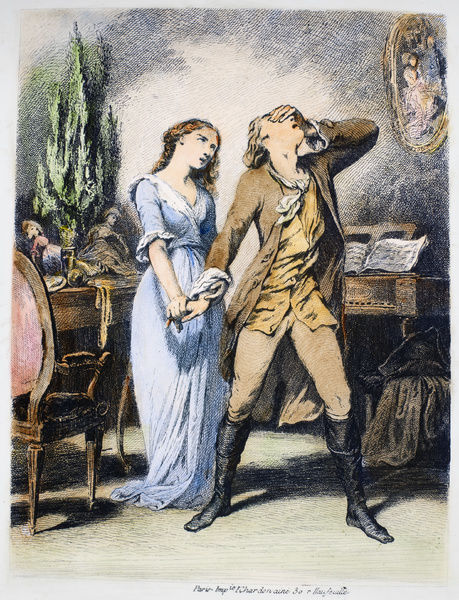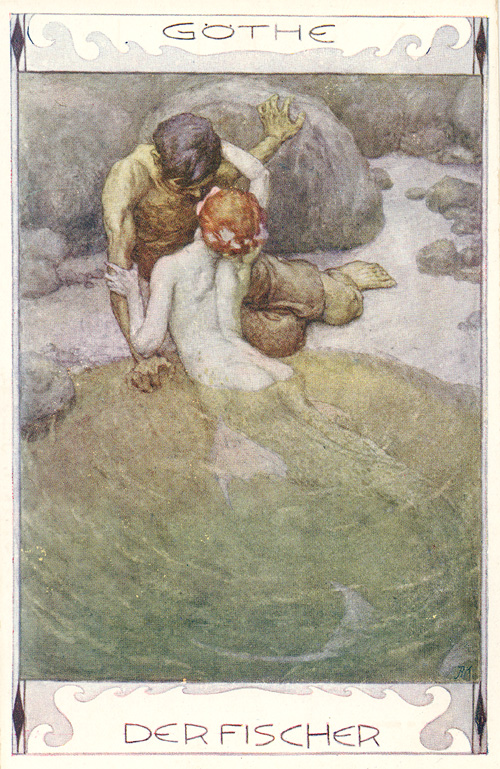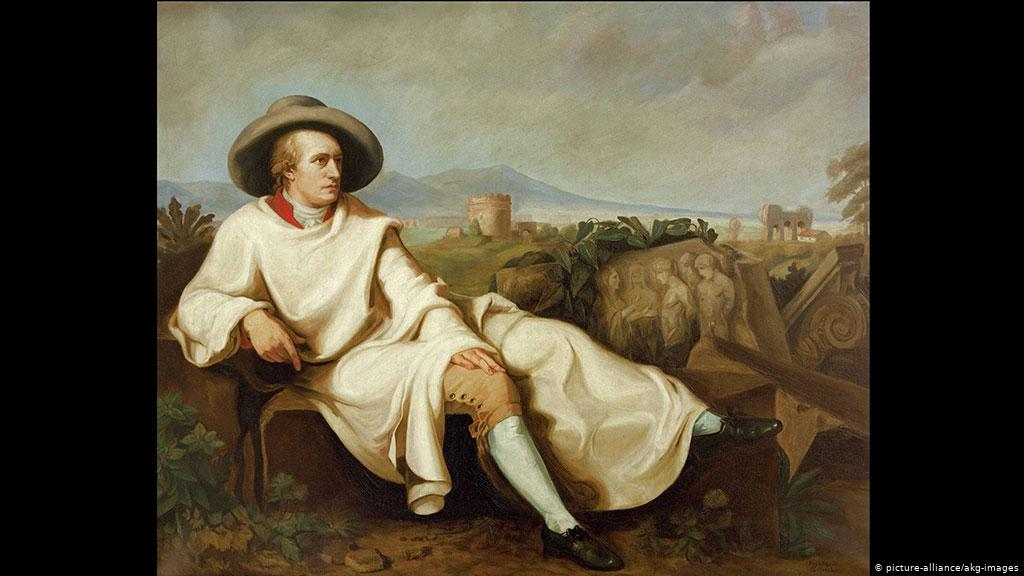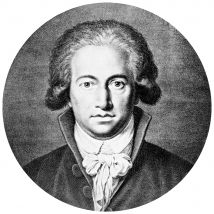Goethe's Advice to Young Artists
I read Conversations with Goethe when I was finishing up my fine arts training in Barcelona. I felt Goethe’s words, unsurprisingly, as the truest and clearest I’ve ever heard anybody speak about doing art.
I recently had Goethe’s advice resurfacing in one of my favorite John Lennon songs:
One day at a time is all we do. One day at a time is good for you. -One Day (At A Time)
Also: Meeting a Master and Conversations with Goethe

On Making Small Things, Fresh
“My advice to youth is always to treat only small objects,” Goethe replied, “but does one do what we old people say? Everyone believes that he must know it best himself, and in so doing some get lost, and some have long to err in this.
But there is no time to err now, we old men have been for that; and what would all our searching and erring have helped us, if you younger people wanted to walk the same paths again?
We would never get anywhere! We old men are credited with error, because we did not find the paths blazed; but he who enters the world later on is asked more of him, he should not err and seek again, but should make use of the counsel of the old men and proceed straight away on the good way. It shall not be enough that steps be taken that once lead to the goal, but every step shall be goal and be regarded as a step.
For the time being, as I have said, you always make only small objects, always freshly prepare everything that presents itself to you daily, you will usually always do something good, and every day will bring you joy. Give it first into the paperbacks, into the magazines; but never submit to foreign demands, but always do it according to your own sense.
The world is so large and rich and life so varied that there will never be any lack of occasions for poetry. But they must all be occasional poems, that is, reality must provide the occasion and the material for them.
I made almost all my best drawings in an afternoon and on a small (A4) canvas. I had many bigger artistic projects, but they tended to not get finished. Entropy took its share and time and space were my enemies.
Big Projects Are Self-Sabotage
More thoughts on being opportunistic, making small things and avoiding big plans
All of my poems are occasional poems, they are inspired by reality and have their roots in it. I don’t think much of poems, plucked from the air.
We spoke of his ‘Journey via Frankfurt and Stuttgart to Switzerland’, which he has in three booklets and which he wants to send me so that I can read the details and make suggestions on how to make a whole out of it. “You will see,” he said, “everything is only written down as the moment was; there is no plan or artistic curve in it, it is like pouring out a bucket of water”. I was pleased with this parable, which seemed to me very suitable to describe something quite aimless.
The advantage of small things is that you only have to choose and will only choose those objects that you know, that you are master of. But that is not possible in a great poetic work, where it is not possible to avoid it; everything that belongs to the connection of the whole and is interwoven into the plan must be represented, and with truth that is true. But with youth the knowledge of things is still one-sided; but a great work requires versatility, and that is the point of failure.

The fisherman may succeed, but the hunter may not. But if something in the whole is not right, it is defective as a whole, however good individual parts may be, and you have not achieved anything perfect. But if you simply present the individual games that you are up to independently, you will surely do something good.
[…] But for the time being, leave aside anything great. You have striven long enough, it is time that you reached the serenity of life, and the best way to do this is to work on small objects.
With every step I took it became easier and happier, because I only want to confess that various larger plans, which I have not been able to come to terms with so far, have been no small burden to me. Now I have thrown them away from me, and they may rest until I take up and draw one object and one part after another with amusement, just as I gradually become a master by exploring the world of the individual parts of the material.
Don’t Invent Everything From Scratch
I warn you especially against your own great inventions; for there you want to give a view of things, and it is seldom mature in youth. Furthermore: Characters and views detach themselves from the poet as sides of him and rob him of abundance for more distant productions. And finally: what time is not lost in invention and inner arrangement and connection, whereupon no one does us any good, provided that we come into being at all with our work.
With a given material, however, everything is different and easier. There fact and character are handed down, and the poet has only the animation of the whole. In this he also preserves his own fullness, for he needs to add only a little of his own, and the loss of time and strength is much less, for he has only the difficulty of execution.
Yes, I even advise to use objects that have already been worked on. How often is not Iphigenia made, and yet all are different; for each one sees and places things differently, according to his own way.

Learning By Yourself is No Virtue. Find A Master
One sees,” said Goethe, “that the young man has talent; but that he learned everything by himself, therefore one should not praise him, but scold him. A talent is not born to be left to itself, but to turn to art and good masters, who then make something of him.
[…] Goethe continued: “Leonardo da Vinci says: ‘If your son does not have the sense to emphasize what he draws with strong shading in such a way that you want to grasp it with your hands, he has no talent. And further Leonardo da Vinci says: ‘If your son has complete command of perspective and anatomy, make him a good master. And now,” said Goethe, “our young artists hardly understand both when they leave their masters. Times have changed so much.”
[…] “It is not enough to have talent, more is needed to become clever; one must also live in great circumstances and have the opportunity to look at the playing figures of the time and to play along with you own profit and losses”
Know Where Your Art Stops
The Arts are not all General purpose Languages, pick your tools for their purpose.
But the poet should not want to be a painter, but should be content to reproduce the world through the word; just as he leaves it to the actor to bring it before our eyes through personal representation.
For insight and activity in life are to be distinguished, and one is to bear in mind that every art, as soon as it depends on the exercise, is something very difficult and great, in which to master it, a life of its own is demanded.
 The Fisher
The Fisher
Very few artists,” he continued, “are aware of this point, and know what serves for their peace. There they paint, for example, my ‘fisherman’ and do not consider that it cannot be painted at all. For in this ballad it is only the feeling of water that is expressed, the gracefulness that tempts us to bathe in summer; there is nothing else in it, and how can it be painted!
Work With The Present. One Day At A Time
On the whole, a writer’s style is a faithful imprint of his inner being; if someone wants to write a clear style, let him be clear in his soul beforehand; and if someone wants to write a great style, let him have a great character.
“It is a sea to drink,” said Goethe, “if one enters into a historical and critical investigation of this”
It is always better to stick to what is really there without further ado, and to acquire what one can use for one’s moral culture and strengthening.
Eckermann and Goethe look at one of his earlier poems
“You see the product of a most passionate state,” he added; “when I was imprisoned in it, I would not have been able to do without it for anything in the world, and now I do not want to get back into it at any price. I wrote the poem just as I was leaving Marienbad and I was still in the full fresh feeling of what I had experienced.
At eight o’clock in the morning on the first station I wrote the first verse, and so I continued to write poetry in the carriage and from station to station I wrote down what I had written down in my memory, so that it was finished on the paper in the evening. It therefore has a certain immediacy and is as if it is cast from a single mold, which may benefit the whole”.
 Chillin
Chillin
Betting On The Present
“I bet on the present, just as one bets a significant sum on a card, and without exaggeration sought to raise it as high as possible. This statement seemed to me to be very important in bringing Goethe’s method to light and explaining his generally admired diversity.
“And then, under each poem, always put the date when you made it.” I looked at him questioningly, why is this so important? “It then applies,” he added, “at the same time as a diary of your conditions. And that is nothing small. I’ve been doing it for years and I see what it means.”
“Just stick to it and always hold on to the present. Every state, indeed every moment, is of infinite value, for it is the representative of a whole eternity.
On Giving Advice :)
“Giving advice is a thing of its own,” said Goethe, “and when one has seen for a while in the world how the most clever things fail and the most absurd often leads to a happy goal, then one probably refrains from wanting to give advice to someone. Basically it is also of him who demands advice a limitation, and of him who gives it an insolence.
One should give advice only in things in which one wants to participate oneself. If another asks me for good advice,I may well say that I am ready to give it, but only on the condition that he will promise not to act upon it.

Appendix: Original German
On Making Small Things and Milking the Muse
“Mein Rat an die Jugend is immer nur kleine Gegenstände zu behandeln” erwiderte Goethe; »aber tut man denn, was wir Alten sagen? Jeder glaubt, er müsse es doch selber am besten wissen, und dabei geht mancher verloren, und mancher hat lange daran zu irren.
Es ist aber jetzt keine Zeit mehr zum Irren, dazu sind wir Alten gewesen; und was hätte uns alle unser Suchen und Irren geholfen, wenn ihr jüngeren Leute wieder dieselbigen Wege laufen wolltet?
Da kämen wir ja nie weiter! Uns Alten rechnet man den Irrtum zugute, weil wir die Wege nicht gebahnt fanden; wer aber später in die Welt eintritt, von dem verlangt man mehr, der soll nicht abermals irren und suchen, sondern er soll den Rat der Alten nutzen und gleich auf gutem Wege fortschreiten. Es soll nicht genügen, daß man Schritte tue, die einst zum Ziele führen, sondern jeder Schritt soll Ziel sein und als Schritt gelten.
Machen Sie vorderhand, wie gesagt, immer nur kleine Gegenstände, immer alles frischweg, was sich Ihnen täglich darbietet, so werden Sie in der Regel immer etwas Gutes leisten, undjeder Tag wird Ihnen Freude bringen. Geben Sie es zunächst in die Taschenbücher, in die Zeitschriften; aber fügen Sie sich nie fremden Anforderungen, sondern machen Sie es immer nach Ihrem eigenen Sinn.
Die Welt ist so groß und reich und das Leben so mannigfaltig, daß es an Anlässen zu Gedichten nie fehlen wird. Aber es müssen alles Gelegenheitsgedichte sein, das heißt, die Wirklichkeit muß die Veranlassung und den Stoff dazu hergeben.
Big Projects Are Self-Sabotage
Alle meine Gedichte sind Gelegenheitsgedichte, sie sind durch die Wirklichkeit angeregt und haben darin Grund und Boden. Von Gedichten, aus der Luft gegriffen, halte ich nichts.
Wir sprachen von seiner ›Reise über Frankfurt und Stuttgart nach der Schweiz‹, die er in drei Heften liegen hat und die er mir zusenden will, damit ich die Einzelheiten lese und Vorschläge tue, wie daraus ein Ganzes zu machen. »Sie werden sehen,« sagte er, »es ist alles nur so hingeschrieben, wie es der Augenblick gab; an einen Plan und eine künstlerische Rundung ist dabei gar nicht gedacht, es ist, als wenn man einen Eimer Wasser ausgießt.« Ich freute mich dieses Gleichnisses, welches mir sehr geeignet erschien, um etwas durchaus Planloses zu bezeichnen.
Vorteil bei kleinen Sachen, daß man nur solche Gegenstände zu wählen braucht und wählen wird, die man kennet, von denen man Herr ist. Bei einem großen dichterischen Werk geht das aber nicht, da läßt sich nicht ausweichen, alles, was zur Verknüpfung des Ganzen gehört und in den Plan hinein mit verflochten ist, muß dargestellt werden, und zwar mit getroffener Wahrheit. Bei der Jugend aber ist die Kenntnis der Dinge noch einseitig; ein großes Werk aber erfordert Vielseitigkeit, und daran scheitert man.«
Es gelingt Ihnen vielleicht der Fischer, aber der Jäger vielleicht nicht. Gerät aber am Ganzen etwas nicht, so ist es als Ganzes mangelhaft, so gut einzelne Partien auch sein mögen, und Sie haben nichts Vollendetes geleistet. Stellen Sie aber bloß die einzelnen Partien für sich selbständig dar, denen Sie gewachsen sind, so machen Sie sicher etwas Gutes.
Aber lassen Sie vorderhand alles Große zur Seite. Sie haben lange genug gestrebt, es ist Zeit, daß Sie zur Heiterkeit des Lebens gelangen, und dazu eben ist die Bearbeitung kleiner Gegenstände das beste Mittel.«
Bei jedem Schritt ward es mir leichter und glücklicher, denn ich will nur gestehen, daß verschiedene größere Pläne, womit ich bis jetzt nicht recht ins klare kommen konnte, mir keine geringe Last gewesen sind. Jetzt habe ich sie von mir geworfen, und sie mögen nun ruhen, bis ich einmal einen Gegenstand und eine Partie nach der andern mit Heiterkeit wieder aufnehme und hinzeichne, so wie ich nach und nach durch Erforschung der Welt von den einzelnen Teilen des Stoffes Meister werde.
In the Beginning, Don’t Reinvent The Wheel
Besonders warne ich vor eigenen großen Erfindungen; denn da will man eine Ansicht der Dinge geben, und die ist in der Jugend selten reif. Ferner: Charaktere und Ansichten lösen sich als Seiten des Dichters von ihm ab und berauben ihn für fernere Produktionen der Fülle.
Und endlich: welche Zeit geht nicht an der Erfindung und inneren Anordnung und Verknüpfung verloren, worauf uns niemand etwas zugute tut, vorausgesetzt, daß wir überhaupt mit unserer Arbeit zustande kommen. Bei einem gegebenen Stoff hingegen ist alles anders und leichter. Da werden Fakta und Charaktere überliefert, und der Dichter hat nur die Belebung des Ganzen.
Auch bewahrt er dabei seine eigene Fülle, denn er braucht nur wenig von dem Seinigen hinzuzutun auch ist der Verlust von Zeit und Kräften bei weitem geringer, denn er hat nur die Mühe der Ausführung. Ja, ich rate sogar zu schon bearbeiteten Gegenständen. Wie oft ist nicht die Iphigenie gemacht, und doch sind alle verschieden; denn jeder sieht und stellt die Sachen anders, eben nach seiner Weise.
Find A Master. Don’t Do Everything By Yourself
»Man sieht,« sagte Goethe, »der junge Mann hat Talent; allein daß er alles von selbst gelernt hat, deswegen soll man ihn nicht loben, sondern schelten. Ein Talent wird nicht geboren, um sich selbst überlassen zu bleiben, sondern sich zur Kunst und guten Meistern zu wenden, die denn etwas aus ihm machen.
Ich habe dieser Tage einen Brief von Mozart gelesen, wo er einem Baron, der ihm Kompositionen zugesendet hatte, etwa folgendes schreibt: ›Euch Dilettanten muß man schelten, denn es finden bei euch gewöhnlich zwei Dinge statt: entweder ihr habt keine eigene Gedanken, und da nehmet ihr fremde; oder wenn ihr eigene Gedanken habt, so wißt ihr nicht damit umzugehen.‹ Ist das nicht himmlisch? Und gilt dieses große Wort, was Mozart von der Musik sagt, nicht von allen übrigen Künsten?«
Goethe fuhr fort: »Leonardo da Vinci sagt: ›Wenn in euerm Sohn nicht der Sinn steckt, dasjenige, was er zeichnet, durch kräftige Schattierung so herauszuheben, daß man es mit Händen greifen möchte, so hat er kein Talent.‹
Und ferner sagt Leonardo da Vinci: ›Wenn euer Sohn Perspektive und Anatomie völlig innehat, so tut ihn zu einem guten Meister.‹ Und jetzt«, sagte Goethe, »verstehen unsere jungen Künstler beides kaum, wenn sie ihre Meister verlassen. So sehr haben sich die Zeiten geändert.
[…]Es ist nicht genug, daß man Talent habe, es gehört mehr dazu, um gescheit zu werden; man muß auch in großen Verhältnissen leben und Gelegenheit haben, den spielenden Figuren der Zeit in die Karten zu sehen und selber zu Gewinn und Verlust mitzuspielen.
Know Where Your Art Stops
Aber der Dichter soll kein Maler sein wollen, sondern sich begnügen, die Welt durch das Wort wiederzugeben; so wie er dem Schauspieler überläßt, sie durch persönliche Darstellung uns vor die Augen zu bringen. Denn Einsicht und Lebenstätigkeit sollen wohl unterschieden werden, und man soll bedenken, daß jede Kunst, sobald es auf die Ausübung ankommt, etwas sehr Schwieriges und Großes ist, worin es zur Meisterschaft zu bringen, ein eigenes Leben verlangt wird.
Die wenigsten Künstler«, fuhr er fort, »sind über diesen Punkt im klaren und wissen, was zu ihrem Frieden dient. Da malen sie z. B. meinen ›Fischer‹ und bedenken nicht, daß sich das gar nicht malen lasse. Es ist ja in dieser Ballade bloß das Gefühl des Wassers ausgedrückt, das Anmutige, was uns im Sommer lockt, uns zu baden; weiter liegt nichts darin, und wie läßt sich das malen!«
Only Work With The Present
Im ganzen ist der Stil eines Schriftstellers ein treuer Abdruck seines Innern; will jemand einen klaren Stil schreiben, so sei es ihm zuvor klar in seiner Seele; und will jemand einen großartigen Stil schreiben, so habe er einen großartigen Charakter.«
Es ist ein Meer auszutrinken,« sagte Goethe, »wenn man sich in eine historische und kritische Untersuchung dieserhalb einläßt.”
Man tut immer besser, sich ohne weiteres an das zu halten, was wirklich da ist, und sich davon anzueignen, was man für seine sittliche Kultur und Stärkung gebrauchen kann.
Eckermann and Goethe look at one of his earlier poems:
»Sie sehen das Produkt eines höchst leidenschaftlichen Zustandes,« fügte er hinzu; »als ich darin befangen war, hätte ich ihn um alles in der Welt nicht entbehren mögen, und jetzt möchte ich um keinen Preis wieder hineingeraten. Ich schrieb das Gedicht, unmittelbar als ich von Marienbad abreiste und ich mich noch im vollen frischen Gefühle des Erlebten befand.
Morgens acht Uhr auf der ersten Station schrieb ich die erste Strophe, und so dichtete ich im Wagen fort und schrieb von Station zu Station das im Gedächtnis Gefaßte nieder, so daß es abends fertig auf dem Papiere stand. Es hat daher eine gewisse Unmittelbarkeit und ist wie aus einem Gusse, welches dem Ganzen zugute kommen mag.«
Bet on the Present
»Ich setzte auf die Gegenwart, so wie man eine bedeutende Summe auf eine Karte setzt, und suchte sie ohne Übertreibung so hoch zu steigern als möglich.« Diese Äußerung erschien mir sehr wichtig, indem sie Goethes Verfahren ans Licht setzet und uns seine allgemein bewunderte Mannigfaltigkeit erklärlich macht.
»Und dann setzen Sie unter jedes Gedicht immer das Datum, wann Sie es gemacht haben.« Ich sah ihn fragend an, warum das so wichtig. »Es gilt dann«, fügte er hinzu, »zugleich als Tagebuch Ihrer Zustände. Und das ist nichts Geringes. Ich habe es seit Jahren getan und sehe ein, was das heißen will.«
“Beharren Sie nur dabei und halten Sie immer an der Gegenwart fest. Jeder Zustand, ja jeder Augenblick ist von unendlichem Wert, denn er ist der Repräsentant einer ganzen Ewigkeit.«
On Giving Advice
»Es ist mit dem Ratgeben ein eigenes Ding,« sagte Goethe, »und wenn man eine Weile in der Welt gesehen hat, wie die gescheitesten Dinge mißlingen und das Absurdeste oft zu einem glücklichen Ziele führt, so kommt man wohl davon zurück, jemanden einen Rat erteilen zu wollen. Im Grunde ist es auch von dem, der einen Rat verlangt, eine Beschränktheit, und von dem, der ihn gibt, eine Anmaßung.
Man sollte nur Rat geben in Dingen, in denen man selber mitwirken will. Bittet mich ein anderer um guten Rat, so sage ich wohl, daß ich bereit sei, ihn zu geben, jedoch nur mit dem Beding, daß er versprechen wolle, nicht danach zu handeln.«